21世纪大学英语读写教程第四册课文翻译
21世纪大学英语读写教程第四册cloze中英文对照版
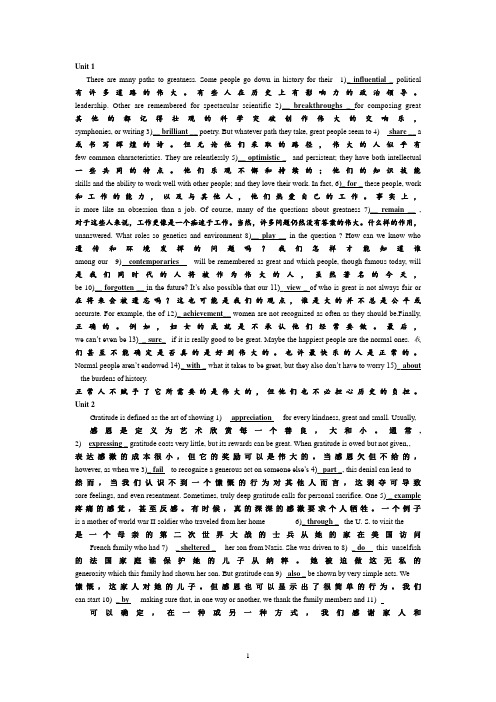
Unit 1There are many paths to greatness. Some people go down in history for their 1)_ influential _political 有许多道路的伟大。
有些人在历史上有影响力的政治领导。
leadership. Other are remembered for spectacular scientific 2)__ breakthroughs _ for composing great 其他的都记得壮观的科学突破创作伟大的交响乐,symphonies, or writing 3)__ brilliant __ poetry. But whatever path they take, great people seem to 4)__ share __ a 或书写辉煌的诗。
但无论他们采取的路径,伟大的人似乎有few common characteristics. They are relentlessly 5)__ optimistic __ and persistent; they have both intellectual 一些共同的特点。
他们乐观不懈和持续的;他们的知识技能skills and the ability to work well with other people; and they love their work. In fact, 6)_ for _ these people, work 和工作的能力,以及与其他人,他们热爱自己的工作。
事实上,is more like an obsession than a job. Of course, many of the questions about greatness 7)__ remain __, 对于这些人来说,工作更像是一个痴迷于工作。
当然,许多问题仍然没有答案的伟大。
21世纪大学生读写教程第四册READING ALOUD汉英+课后翻译
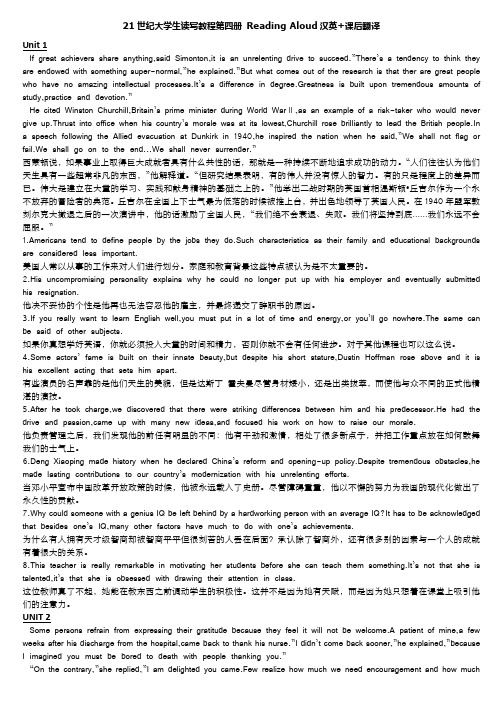
21世纪大学生读写教程第四册Reading Aloud汉英+课后翻译Unit 1If great achievers share anything,said Simonton,it is an unrelenting drive to succeed.”There‟s a tendency to think they are endowed with something super-normal,”he explained.”But what comes out of the research i s that ther are great people who have no amazing intellectual processes.It‟s a difference in degree.Greatness is built upon tremendous amounts of study,practice and devotion.”He cited Winston Churchill,Britain‟s prime minister during World WarⅡ,as an example of a risk-taker who would never give up.Thrust into office when his country‟s morale was at its lowest,Churchill rose brilliantly to lead the British people.In a speech following the Allied evacuation at Dunkirk in 1940,he inspired the nation when he said,”We shall not flag or fail.We shall go on to the end...We shall never surrender.”西蒙顿说,如果事业上取得巨大成就者具有什么共性的话,那就是一种持续不断地追求成功的动力。
21世纪大学英语读写教程4第四单元课文中英对照
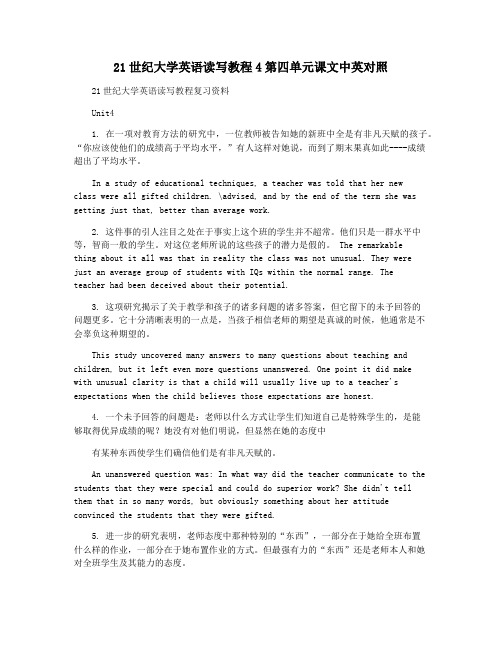
21世纪大学英语读写教程4第四单元课文中英对照21世纪大学英语读写教程复习资料Unit41. 在一项对教育方法的研究中,一位教师被告知她的新班中全是有非凡天赋的孩子。
“你应该使他们的成绩高于平均水平,”有人这样对她说,而到了期末果真如此----成绩超出了平均水平。
In a study of educational techniques, a teacher was told that her newclass were all gifted children. \advised, and by the end of the term she was getting just that, better than average work.2. 这件事的引人注目之处在于事实上这个班的学生并不超常。
他们只是一群水平中等,智商一般的学生。
对这位老师所说的这些孩子的潜力是假的。
The remarkablething about it all was that in reality the class was not unusual. They werejust an average group of students with IQs within the normal range. Theteacher had been deceived about their potential.3. 这项研究揭示了关于教学和孩子的诸多问题的诸多答案,但它留下的未予回答的问题更多。
它十分清晰表明的一点是,当孩子相信老师的期望是真诚的时候,他通常是不会辜负这种期望的。
This study uncovered many answers to many questions about teaching and children, but it left even more questions unanswered. One point it did makewith unusual clarity is that a child will usually live up to a teacher's expectations when the child believes those expectations are honest.4. 一个未予回答的问题是:老师以什么方式让学生们知道自己是特殊学生的,是能够取得优异成绩的呢?她没有对他们明说,但显然在她的态度中有某种东西使学生们确信他们是有非凡天赋的。
21世纪大学英语(读写教程)第四册课文全翻译

如何变得有天赋朱利叶斯·法斯特芭芭拉·法斯特在一项对教育方法的研究中,一位教师被告知她的新班中全是有非凡天赋的孩子。“你应该从他们那儿获得高于平均水平的成绩,”有人这样通知她,而到了期末她所得到的正是这个——超出平均水平的成绩。这件事的引人注目之处在于事实上这个班的学生并非异乎寻常。他们只是一群中等水平的、智商处于正常范围之内的学生。这位老师被告知的并不是他们真实的潜力。这项研究揭示了许多关于教学和孩子问题的许多答案,但它留下的未回答的问题更多。但它的确非常清晰地表明了一点,即当一个孩子相信老师的期望是真诚的时候,他通常是不会辜负这种期望的。一个没有回答的问题是:那位老师是以什么方式向学生们表明他们是特殊的,能取得优异成绩的呢?她没有用许多话告诉他们这一点,但显然在她的态度中有某种东西使学生们确信他们是有非凡天赋的。进一步的研究表明,老师态度中那种特别的“东西”,一部分是她给全班布置的作业,一部分是她布置作业的方式。但最强有力的“东西”还是老师本人和她对全班学生及其能力的态度。当她说“你们是聪明的孩子”时,她的声音中有更多的信心和关注。一直有一种鼓励性的语气在告诉他们他们会取得进步,很大的进步。孩子们收到了这些信号,并对它们作出了积极的反应。某个学生的成绩达不到老师的期望是常有的事。当这种情况发生时,那个学生面对的不是失望、愤怒或恼怒。相反,老师认为这是一次例外,一件偶然的事情,倒霉的一天,一次暂时的失误——而学生相信了她,并消除了疑虑。下一次,他更加努力了,决心做到老师知道他能做到的事。很难精确地确定老师传达的信息:“我期待着最好的成绩,”中到底是哪一部分告诉了孩子。它的一部分包括显示信心的平和语调,言语上的耐心,及没有讽刺、贬低和恼怒等消极因素。期待着最好成绩的老师满怀信心地提问,因为她知道她得到的答案将是正确的,而孩子也感受到了那种信心。这一信息大多是通过声音传递的,但也有相当惊人的一部分表现在态度、接触和面部表情上。跟这个对“天才”儿童所做的实验相类似的实验也在“天才”老鼠的身上做了。一位科学家得到的是一群普通的老鼠,但却被告知它们是一个特殊的品种,曾接受过在创记录的时间里穿越迷宫的训练。在与这些老鼠一起工作时,这位科学家发现它们确实比其他老鼠学得快,穿越迷宫也的确更迅速。但是老鼠对我们的语言一无所知。那位科学家是怎样得以将他的期望传达给它们的呢?对实验中所有变量的检查表明,这些异常好的结果应归功于他对待老鼠的方式,他对它们讲话的方式和语调,他声音中的信心、安抚和确定无疑。老鼠理解了所有的信息,并照着做了。从更广泛的角度看这两个实验,那位老师和那位科学家都运用了一个对所有社会各个阶层的人都通用的原则——贴标签原则。我们所有的期待都带有偏见,我们对于不同的人有着完全不同的期望,甚至对各个民族也是如此。我们依据民族特点来判断人。我们认为美国人贪婪,想赚大钱,我们在心里给他们贴上了这样的标签。我们给德国人贴的标签是整洁而有条理,英国人是冷漠、不友好和矝持寡言,意大利人是易动感情,日本人彬彬有礼——等等等等。我们在一个非常宽阔的、远非同质的群体上贴了一张非常狭小的标签。我们在种族层面上也是这样。黑人有音乐感,印第安人坚忍,东方人神秘莫测。我们甚至给性别贴上标签——男人积极进取、女人消极被动。在家庭层面上,标签有时是由邻居们贴上的。“琼斯一家都是废物……总是依靠救济。”有时标签也许是由那家人自己贴的。“我们史密斯一家宁愿挨饿也不会请求政府帮助!”史密斯家的男孩因带着这个令人敬畏的独立标签长大,很容易与自己的标签名实相符,正如琼斯家的女孩很容易与她的标签名实相符一样:“他们都认为我们是废物?那我就表现得像废物!”这种标签也许不太全面,甚至带有性别歧视。某个家庭也许会自豪地说,“我们家的男人一直都是专业人员。”当这个家庭里的一个儿子比尔发现木工活是他最喜爱的工作时,他便面对着同家庭的冲突——以及同自己的冲突。他内心的力量也许能使他按照自己的意愿坚持到底,成为一个木匠,但另一方面他也知道他没有符合家庭的标签,因此他怀着一种负罪感度过一生。他甚至可能给自己创造标签。“我是一个失败者,真的。”即使比尔在自己这一行里是个成功者,经过一段时间以后拥有了自己的企业,比他当律师的兄弟鲍勃赚的钱还多,那也没用。比尔仍然不是一个专业人员,因此他内心的标签上仍然写着失败。在家庭内部贴标签很早便开始了。在宝宝听得懂口头语言之前,他便能对肢体语言和间接交流作出反应了。他在懂得词语之前,已经从父母的声音中感受到爱,他也感受到嫌弃、冷淡、恐惧或敌意,他也对这些情绪作出了反应。如果他得到的是爱和温柔,他也以爱和温柔作出反应。以后,当他理解言语时,他便接受他的标签。吉米是家里的乖孩子,而一向难弄的莎莉则得到了惹是生非者的标签。每个孩子除了名字外还得到一个标签。她是聪明的。他爱出风头。诺曼老是迟到。贝蒂不招人爱。芭芭拉很冷漠。杰克很野。纳塔莉很甜,等等等等。这些标签也许反映了事实。纳塔莉也许很甜,但往往是标签把现实强加于孩子身上。如果纳塔莉经常听到别人说她很甜,她便开始表现得很甜。你往往会使自己与你的标签名实相符。同样,参加教学实验的学生们被加上了聪明的标签,于是他们便设法变得聪明,超常地发挥了他们的许多当面或在电视上听我讲话的人,或者那些读到我讲话的人都以为我的学历远远不止八年级。这一印象完全归功于我在监狱中的学习。这是在查尔斯顿监狱真正开始的,当时宾比第一次让我对他渊博的知识感到了羡慕。无论参与什么交谈,宾比总是起着主导作用,而我也曾经试图效仿他。但我找到的每本书中,几乎每句句子都有一个以上甚至几乎全部的单词我压根儿不认识。当我跳过那些词时,我最终当然不知道书中所云。所以我来到诺福克监狱时,仍然只有看看书的意愿。要不是我后来获得了动力,我本来很快就会连这些愿望也丢弃的。我明白我最好是能弄到一本字典——为的是学习,学一些单词。幸好我还想到应该努力提高一下自己的书写水平。我的书写很糟糕,甚至于不能将字写在一条直线上。这两个想法促使我要求诺福克监狱学校给我一本字典以及一些便笺簿和铅笔。头两天我还拿不定主意,只是随便翻了翻字典。我从来没有意识到会有这么多单词!我不知道哪些词是我需要学习的。最后,为了开始某种行动,我便开始了抄写。我把印在第一页上的所有东西甚至标点符号,慢慢地、费力地、歪歪斜斜地抄到了我的便笺簿里。我记得那花了我一天的时间。然后,我便把写在便笺簿上的每个词大声读给自己听。我一遍又一遍地把自己写的东西大声读给自己听。第二天早上醒来时我还想着那些词——我无比自豪地意识到,我不仅一下子写了那么多,还写了许多我从来不知道存在于这个世界上的词。而且,我稍微动一下脑筋还能记得其中许多词的意思。我复习了那些被我忘记了意思的单词。有趣的是,就在此刻,词典第一页上的“土豚”一词竟跳入了我的脑海之中。字典上有它的一幅插图,一种长尾、长耳、会挖洞的非洲哺乳动物,以白蚁为食,像食蚁动物捕食蚂蚁那样伸出舌头来捕食白蚁。我完全被迷住了,于是又继续干下去——我抄写了字典的下一页。当我学习它时我获得了同样的体验。随着以后的每一页,我还了解了人物、地方和历史事件。实际上字典就像一部小型百科全书。最后,字典的A部分抄满了一整本便笺簿——于是我便继续抄写B部分。我就这样开始抄写了整本字典。如此多的实践帮我提高了书写速度,所以以后我抄得快多了。包括我写在便笺簿上的词和写的信,我猜我在后来的囚禁日子里足足写下了一百万词。我认为随着词汇量的增加,我肯定能第一次拿起一本书来读并开始理解书中讲的内容了。任何一个博览群书的人都能想象得出那个被打开的新世界。让我告诉你一些事;从那以后直到我离开那所监狱,在我的每一段空闲时间里,我不是在图书馆里看书,就是在我的床上看书。你哪怕用楔子也休想把我跟书分开。我学习穆罕默德先生的教导,我跟别人通信,我会客,我读书,日子就这样一个月一个月地过去了,我甚至没有想到自己是在坐牢。事实上,在那之前,我在生活中从来没有那样真正自由过……正如你能想象的,尤其在一个特别强调改造的监狱里,如果一个犯人表现出对书籍异乎寻常的强烈兴趣,他就会受到赞许。犯人中有相当多的博览群书者,尤其是受广欢迎的辩论家。一些人被公认为活的百科全书。他们几乎成了名人。当这个新世界,这个能够阅读并理解的新世界向我敞开时,我贪婪地阅读文学作品,数量之多超过了任何一所大学对任何一个学生的要求。我在自己的房间里比在图书馆里读得更多。一个以读书多而出名的犯人能超出规定借出更多的书。我更喜欢在与外界完全隔绝的自己的房间里读书。当我发展到开始读非常严肃的读物时,每天晚上10点左右,我会因为“熄灯”而愤怒不已。它似乎总是在我正读到引人入胜之处时来跟我捣乱。幸好在我的门外面有一盏走廊灯把光线照到我的房间里。一旦我的眼睛适应之后,这点光线就足以让我读书。所以“熄灯”后,我就坐在地板上,借着那点光继续读书。夜间看守每隔一小时就走过每个房间。每次听到越来越近的脚步声,我就跳到床上假装睡觉。看守一走过去,我就从床上回到地板上那块亮的地方,再读上58分钟——直到看守再次走过来。这样一直持续到每天凌晨三四点钟。每天晚上睡三四个小时对我来说就足够了。在流落街头的那些日子里我经常睡得更少。我经常思考阅读为我打开的那些新的远景。我当时在狱中就知道,阅读已永远改变了我的人生历程。正如我现在所认识到的,阅读能力唤醒了在我内心潜伏已久的对于思想活跃的渴望。我当然不是在追求任何学位,那只是大学授予学生一种地位象征的方式。我通过自学所受到的教育使我每读一本新书就更意识到正在折磨着美国黑色人种的聋、哑和盲。不久前,一位英国作家从伦敦打来电话问了我几个问题。其中一个问题是,“你的母校是哪儿?”我告诉他,“是书。”在任何一个空闲的十五分钟里,你都会发现我在学习一些我觉得可能有助于黑人的东西……每次乘飞机,我都带一本想读的书——至今已读了很多书。如果我现在不是每天出来同白人斗争,我会将余生用于阅读,仅仅是为了满足我的好奇心——因为你几乎说不出什么东西是我不感到好奇的。 我想任何人都没有像我那样从坐牢中获得了那么多。事实上,如果我的生活是另一个样子,如果我上了大学,我就不能像在监狱里那样能更集中地进行学习。我想上大学最大的麻烦之一就是有太多让人分心的事。除了监狱还有什么地方能让我有时候每天集中学习15个小时来克服我的愚昧无知呢?
21世纪大学英语读写教程第四册答案解析与课文翻译
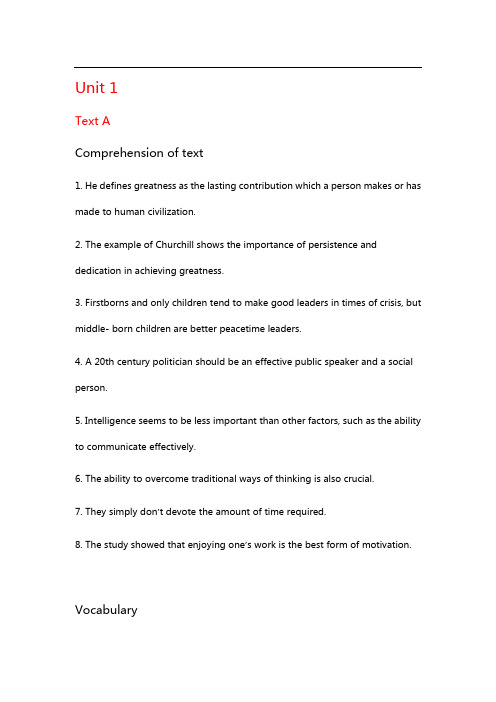
Unit 1Text AComprehension of text1. He defines greatness as the lasting contribution which a person makes or has made to human civilization.2. The example of Churchill shows the importance of persistence and dedication in achieving greatness.3. Firstborns and only children tend to make good leaders in times of crisis, but middle- born children are better peacetime leaders.4. A 20th century politician should be an effective public speaker and a social person.5. Intelligence seems to be less important than other factors, such as the ability to communicate effectively.6. The ability to overcome traditional ways of thinking is also crucial.7. They simply don’t devote the amount of time required.8. The study showed that enjoying one’s work is the best form of motivation. Vocabulary1 chat 2.acknowledge 3.motivated 4.charcteristic 5 despite 6.influential 7.cited 8.obstacle9 intrinsic 10.criteria 11.obsession 12.innate13 contribution(s) 14.contemporary 15.submitted 16.morale1 left behind 2.rise 3.made history 4.were endowed with 5 put up with 6.going nowhere 7.ifocuses on 8.be built on9 put in e up with 11.take charge 12.set...apartWord buildingefficiency emergency fluency frequencyproficiency tendency urgency sufficiency1 fluency 2.proficiency 3.emergency4.Efficiency 5 tendency 6.frequencyStructure1. For some students, it's not that they don't put in enough time — it's that they don’t have good study habits.2. Children perform differently at school. It's not that they have different IQs —it's that they are brought up in different environments.3. The company is not very productive. It's not that its staff aren't talented — it's that their energy hasn't been channeled effectively.4. I’m really sorry. It's not that I don't want to go to the cinema with you— it's that I have to finish my paper tonight.5. You have a stomachache. It's not that the food was bad — it's probably that you have too much stress from your work.1. President Wilson didn't try to bring the US back to economic and political isolation. Instead, he believed in international cooperation through an association of nations.puters don't teach students in groups. Instead, they can help them learn effectively according to their different needs.3. We shouldn't focus on minor points. Instead, we should try to solve the problem of the greatest urgency at present.4. He doesn’t get anybody else to help him. Instead, he likes to attend to everything himself.5. Teaching success shouldn't be measured by the scores the students receive on tests. Instead, it should be measured by whether the students have internalized the ability and desire to learn.Close1-5 BCBAD6-10 DCABA11-15 DABCATransition西蒙顿说,如果事业上取得巨大成就者具有什么共性的话,那就是一种持续不断地追求成功的动力。
21世纪大学英语读写教程(四)unit2课文原文及翻译
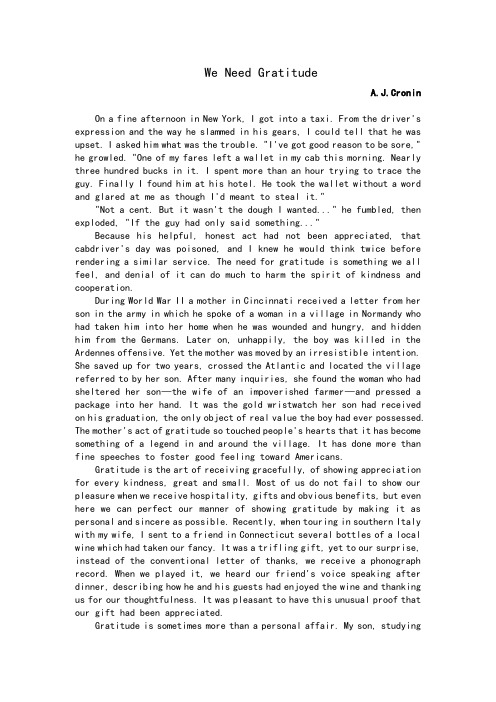
We Need GratitudeA.J.CroninOn a fine afternoon in New York, I got into a taxi. From the driver's expression and the way he slammed in his gears, I could tell that he was upset. I asked him what was the trouble. "I've got good reason to be sore," he growled. "One of my fares left a wallet in my cab this morning. Nearly three hundred bucks in it. I spent more than an hour trying to trace the guy. Finally I found him at his hotel. He took the wallet without a word and glared at me as though I'd meant to steal it.""Not a cent. But it wasn't the dough I wanted..." he fumbled, then exploded, "If the guy had only said something..."Because his helpful, honest act had not been appreciated, that cabdriver's day was poisoned, and I knew he would think twice before rendering a similar service. The need for gratitude is something we all feel, and denial of it can do much to harm the spirit of kindness and cooperation.During World War II a mother in Cincinnati received a letter from her son in the army in which he spoke of a woman in a village in Normandy who had taken him into her home when he was wounded and hungry, and hidden him from the Germans. Later on, unhappily, the boy was killed in the Ardennes offensive. Yet the mother was moved by an irresistible intention. She saved up for two years, crossed the Atlantic and located the village referred to by her son. After many inquiries, she found the woman who had sheltered her son—the wife of an impoverished farmer—and pressed a package into her hand. It was the gold wristwatch her son had received on his graduation, the only object of real value the boy had ever possessed. The mother's act of gratitude so touched people's hearts that it has become something of a legend in and around the village. It has done more than fine speeches to foster good feeling toward Americans.Gratitude is the art of receiving gracefully, of showing appreciation for every kindness, great and small. Most of us do not fail to show our pleasure when we receive hospitality, gifts and obvious benefits, but even here we can perfect our manner of showing gratitude by making it as personal and sincere as possible. Recently, when touring in southern Italy with my wife, I sent to a friend in Connecticut several bottles of a local wine which had taken our fancy. It was a trifling gift, yet to our surprise, instead of the conventional letter of thanks, we receive a phonograph record. When we played it, we heard our friend's voice speaking after dinner, describing how he and his guests had enjoyed the wine and thanking us for our thoughtfulness. It was pleasant to have this unusual proof that our gift had been appreciated.Gratitude is sometimes more than a personal affair. My son, studyingmedicine at McGill University, told me of a patient brought into hospital in Montreal whose life was saved by a blood transfusion. When he was well again he asked: "Isn't there any way I can discover the name of the donor and thank him?" He was told that names of donors are never revealed. A few weeks after his discharge he came back to give a pint of his own blood. Since then he has returned again and again for the same purpose. When a surgeon commented on this splendid record of anonymous service, he answered simply: "Someone I never knew did it for me. I'm just saying 'thanks'".It is a comforting thought that gratitude can be not merely a passing sentiment but a renewal which can, in some instances, persist for a lifetime. A husband who recalls appreciatively some generous or unselfish act on his wife's part, or a wife who never forgets the gifts her husband has given her, does much to keep the domestic wheels spinning smoothly. W.H. Hudson, British author and naturalist, has written: "One evening I brought home a friend to share our usual evening meal. Afterward he said to me:‘you are fortunate to have a wife who, despite ill health and children to look after, cooks such excellent meals.' That tribute opened my eyes and taught me to show gratitude for my wife's day-to-day heroism, which I had hitherto taken for granted."It is, above all, in the little things that the grace of gratitude should be most employed. The boy who delivers our paper, the milkman, the mailman, the barber, the waitress at a restaurant, the elevator operator —all oblige us in one way or another. By showing our gratitude we make routine relationships human and render monotonous tasks more agreeable.A patient of mine in London who worked as a bus conductor once confided to me, "I get fed up with my job sometimes. People grumble, bother you, haven't got the right change for their tickets. But there's one lady on my bus morning and evening, and she always thanks me in a particularly friendly way when I take her ticket. I like to think she's speaking for all the passengers. It helps me to keep smiling."Arnold Bennett had a publisher who boasted about the extraordinary efficiency of his secretary. One day Bennett said to her, "Your employer claims that you are extremely efficient. What is your secret?" "It's not my secret," the secretary replied. "It's his." Each time she performed a service, no matter how small, he never failed to acknowledge it. Because of that she took infinite pains with her work.Some persons refrain from expressing their gratitude because they feel it will not be welcome. A patient of mine, a few weeks after his discharge from the hospital, came back to thank his nurse. "I didn't come back sooner," he explained, "because I imagined you must be bored to death with people thanking you.""On the contrary," she replied, "I am delighted you came. Few realize how much we need encouragement and how much we are helped by those whogive it."Gratitude is something of which none of us can give too much. For on the smiles, the thanks we give, our little gestures of appreciation, our neighbors build up their philosophy of life.一个晴朗的下午,我在纽约上了一辆出租车。
21世纪大学英语读写教程第四册课后答案及翻译
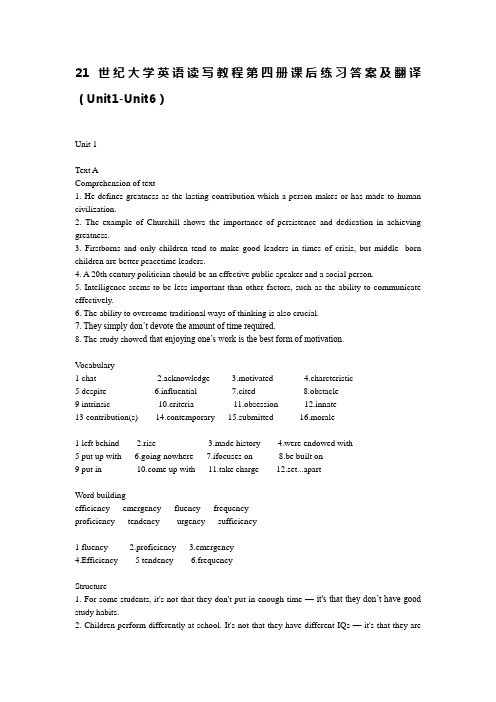
21世纪大学英语读写教程第四册课后练习答案及翻译(Unit1-Unit6)Unit 1Text AComprehension of text1. He defines greatness as the lasting contribution which a person makes or has made to human civilization.2. The example of Churchill shows the importance of persistence and dedication in achieving greatness.3. Firstborns and only children tend to make good leaders in times of crisis, but middle- born children are better peacetime leaders.4. A 20th century politician should be an effective public speaker and a social person.5. Intelligence seems to be less important than other factors, such as the ability to communicate effectively.6. The ability to overcome traditional ways of thinking is also crucial.7. They simply don‟t devote the amount of time required.8. The study showe d that enjoying one‟s work is the best form of motivation.V ocabulary1 chat 2.acknowledge 3.motivated 4.charcteristic5 despite 6.influential 7.cited 8.obstacle9 intrinsic 10.criteria 11.obsession 12.innate13 contribution(s) 14.contemporary 15.submitted 16.morale1 left behind 2.rise 3.made history 4.were endowed with5 put up with 6.going nowhere 7.ifocuses on 8.be built on9 put in e up with 11.take charge 12.set...apartWord buildingefficiency emergency fluency frequencyproficiency tendency urgency sufficiency1 fluency 2.proficiency 3.emergency4.Efficiency 5 tendency 6.frequencyStructure1. For some students, it's not that they don't put in enough time —it's that they don‟t have good study habits.2. Children perform differently at school. It's not that they have different IQs — it's that they arebrought up in different environments.3. The company is not very productive. It's not that its staff aren't talented — it's that their energy hasn't been channeled effectively.4. I‟m really sorry. It's not that I don't want to go to the cinema with you— it's that I have to finish my paper tonight.5. You have a stomachache. It's not that the food was bad — it's probably that you have too much stress from your work.1. President Wilson didn't try to bring the US back to economic and political isolation. Instead, he believed in international cooperation through an association of nations.puters don't teach students in groups. Instead, they can help them learn effectively according to their different needs.3. We shouldn't focus on minor points. Instead, we should try to solve the problem of the greatest urgency at present.4. He doesn‟t get anybody else to help him. Instead, he likes to attend to everything himself.5. Teaching success shouldn't be measured by the scores the students receive on tests. Instead, it should be measured by whether the students have internalized the ability and desire to learn. Close1-5 BCBAD6-10 DCABA11-15 DABCATransition西蒙顿说,如果事业上取得巨大成就者具有什么共性的话,那就是一种持续不断地追求成功的动力。
21世纪大学英语读写教程(四)unit2课文原文及翻译

We Need GratitudeA.J.CroninOn a fine afternoon in New York, I got into a taxi. From the driver's expression and the way he slammed in his gears, I could tell that he was upset. I asked him what was the trouble. "I've got good reason to be sore," he growled. "One of my fares left a wallet in my cab this morning. Nearly three hundred bucks in it. I spent more than an hour trying to trace the guy. Finally I found him at his hotel. He took the wallet without a word and glared at me as though I'd meant to steal it.""Not a cent. But it wasn't the dough I wanted..." he fumbled, then exploded, "If the guy had only said something..."Because his helpful, honest act had not been appreciated, that cabdriver's day was poisoned, and I knew he would think twice before rendering a similar service. The need for gratitude is something we all feel, and denial of it can do much to harm the spirit of kindness and cooperation.During World War II a mother in Cincinnati received a letter from her son in the army in which he spoke of a woman in a village in Normandy who had taken him into her home when he was wounded and hungry, and hidden him from the Germans. Later on, unhappily, the boy was killed in the Ardennes offensive. Yet the mother was moved by an irresistible intention. She saved up for two years, crossed the Atlantic and located the village referred to by her son. After many inquiries, she found the woman who had sheltered her son—the wife of an impoverished farmer—and pressed a package into her hand. It was the gold wristwatch her son had received on his graduation, the only object of real value the boy had ever possessed. The mother's act of gratitude so touched people's hearts that it has become something of a legend in and around the village. It has done more than fine speeches to foster good feeling toward Americans.Gratitude is the art of receiving gracefully, of showing appreciation for every kindness, great and small. Most of us do not fail to show our pleasure when we receive hospitality, gifts and obvious benefits, but even here we can perfect our manner of showing gratitude by making it as personal and sincere as possible. Recently, when touring in southern Italy with my wife, I sent to a friend in Connecticut several bottles of a local wine which had taken our fancy. It was a trifling gift, yet to our surprise, instead of the conventional letter of thanks, we receive a phonograph record. When we played it, we heard our friend's voice speaking after dinner, describing how he and his guests had enjoyed the wine and thanking us for our thoughtfulness. It was pleasant to have this unusual proof that our gift had been appreciated.Gratitude is sometimes more than a personal affair. My son, studyingmedicine at McGill University, told me of a patient brought into hospital in Montreal whose life was saved by a blood transfusion. When he was well again he asked: "Isn't there any way I can discover the name of the donor and thank him?" He was told that names of donors are never revealed. A few weeks after his discharge he came back to give a pint of his own blood. Since then he has returned again and again for the same purpose. When a surgeon commented on this splendid record of anonymous service, he answered simply: "Someone I never knew did it for me. I'm just saying 'thanks'".It is a comforting thought that gratitude can be not merely a passing sentiment but a renewal which can, in some instances, persist for a lifetime. A husband who recalls appreciatively some generous or unselfish act on his wife's part, or a wife who never forgets the gifts her husband has given her, does much to keep the domestic wheels spinning smoothly. W.H. Hudson, British author and naturalist, has written: "One evening I brought home a friend to share our usual evening meal. Afterward he said to me:‘you are fortunate to have a wife who, despite ill health and children to look after, cooks such excellent meals.' That tribute opened my eyes and taught me to show gratitude for my wife's day-to-day heroism, which I had hitherto taken for granted."It is, above all, in the little things that the grace of gratitude should be most employed. The boy who delivers our paper, the milkman, the mailman, the barber, the waitress at a restaurant, the elevator operator —all oblige us in one way or another. By showing our gratitude we make routine relationships human and render monotonous tasks more agreeable.A patient of mine in London who worked as a bus conductor once confided to me, "I get fed up with my job sometimes. People grumble, bother you, haven't got the right change for their tickets. But there's one lady on my bus morning and evening, and she always thanks me in a particularly friendly way when I take her ticket. I like to think she's speaking for all the passengers. It helps me to keep smiling."Arnold Bennett had a publisher who boasted about the extraordinary efficiency of his secretary. One day Bennett said to her, "Your employer claims that you are extremely efficient. What is your secret?" "It's not my secret," the secretary replied. "It's his." Each time she performed a service, no matter how small, he never failed to acknowledge it. Because of that she took infinite pains with her work.Some persons refrain from expressing their gratitude because they feel it will not be welcome. A patient of mine, a few weeks after his discharge from the hospital, came back to thank his nurse. "I didn't come back sooner," he explained, "because I imagined you must be bored to death with people thanking you.""On the contrary," she replied, "I am delighted you came. Few realize how much we need encouragement and how much we are helped by those whogive it."Gratitude is something of which none of us can give too much. For on the smiles, the thanks we give, our little gestures of appreciation, our neighbors build up their philosophy of life.一个晴朗的下午,我在纽约上了一辆出租车。
21世纪大学英语读写教程第四册课文翻译

如今,研究者们有证据证明,对工作的内在热情是出类拔萃的一个关键。现任哈佛大学工商管理教授特蕾莎?阿玛贝尔1985年在布兰代斯大学主持的一项研究中,要求一批专业作家----其中没有一位是有名气的----各写一首短诗。当时每位作家被随机分别编到三个小组中:一个小组要求记住是为金钱而写;另一个小组要求想着只为消遣而写;第三个小组则没有给任何指示。
因此,商人一般当不了好领袖。他们往往是实用主义者,他们认为一旦你说明了某件事情有道理,人们就会去做。但是历史表明这种想法是错误的。当时世变得艰难时,人们不想被得知出了什么问题,不想听人训斥,不想了解许多他们不懂的复杂数据和计划(比如卡特的能源政策)。他们想要受到感动、得到鼓舞、有人激励、有人安慰、感到振奋---总而言之,想有人来领导!
首先,他必须使我们的愿望变得崇高,让我们相信我们正在参与创造伟大的历史,并赋予我们一种荣誉感。温斯顿?丘吉尔通过纯粹的修辞艺术,把英国的失败和1940年的敦刻尔克大撤退变成了大胜利。富兰克林?D?罗斯福的话把美国舰队在珍珠港的沉没变成了动员全国的战斗口号,而不是不光彩的国耻。领袖必须激发我们的热情,而不是唤起我们的理性。
一位中国哲人曾经说过,领袖必须具备优秀舞蹈家的风度,这话很有道理。领袖应该知道如何显得轻松自信。他的步态应该坚定果断。他应该像林肯、罗斯福、杜鲁门、艾克和肯尼迪那样会纵情欢笑,而不是个像尼克松或卡特那样笑得龇牙咧嘴、令人恶心算是心情不错。罗纳德?里根受过的演技训练在他跟卡特的辩论中显示出了良好的效果。他以潇洒自如的举止和显而易见的和蔼可亲成功地给人一种印像,即他事实上是总统而卡特是挑战者。
推荐 21世纪大学英语读写教程第四册课后练习翻译答案精品 精品

21世纪英语读写教程第四册课后翻译答案Unit11.美国人往往以从事的工作来对人们进行划分。
家庭和教育背景这些特点被认为是不太重要的。
Americans tend to define people by the jobs they have/do. Such characteristics as their family and educational backgrounds are considered less important.2.他决不妥协的个性是他再也无法容忍他的雇主,并最终递交了辞职书的原因。
His uncompromising personality explains why he could no longer put up with his employer and eventually submitted his resignation.3.如果你真想学好英语,你就必须投入大量的时间和精力,否则你就不会有任何进步。
对于其他课程也可以这么说。
His uncompromising personality explains why he could no longer put up with his employer and eventually submitted his resignation.If you really want to learn English well, you must put in a lot of time and energy, or you'll go nowhere. The same can be said of other subjects.4.有些演员的名声靠的是他们天生的美貌,但是达斯汀?霍夫曼(Dustin Hoffman) 尽管身材矮小(short stature),还是出类拔萃,而使他与众不同的正是他精湛的演技。
Some actors fame is built on their innate beauty, but despite his short stature, Dustin Hoffman rose above and it is his excellent acting that set him apart.5.他负责管理之后,我们发现他与前任(predecessor)有明显的不同:他有干劲和激情,想出了很多新点子,并把工作重点放在如何鼓舞我们的士气上。
读写教程第四册Unit4课文详解21世纪大学英语
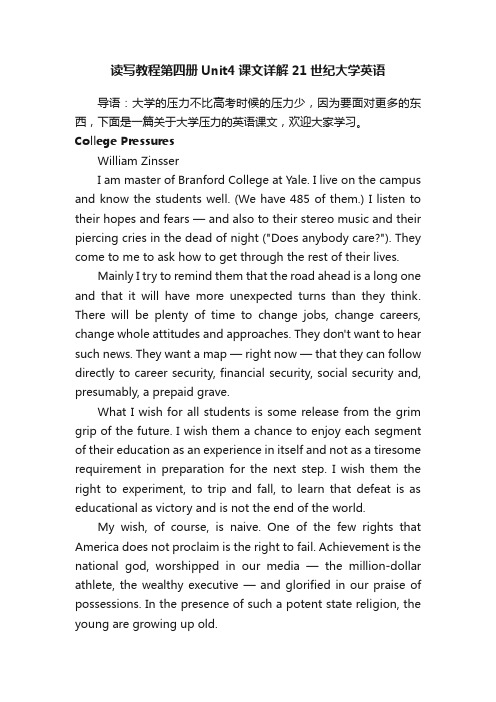
读写教程第四册Unit4课文详解21世纪大学英语导语:大学的压力不比高考时候的压力少,因为要面对更多的东西,下面是一篇关于大学压力的英语课文,欢迎大家学习。
College PressuresWilliam ZinsserI am master of Branford College at Yale. I live on the campus and know the students well. (We have 485 of them.) I listen to their hopes and fears — and also to their stereo music and their piercing cries in the dead of night ("Does anybody care?"). They come to me to ask how to get through the rest of their lives.Mainly I try to remind them that the road ahead is a long one and that it will have more unexpected turns than they think. There will be plenty of time to change jobs, change careers, change whole attitudes and approaches. They don't want to hear such news. They want a map — right now — that they can follow directly to career security, financial security, social security and, presumably, a prepaid grave.What I wish for all students is some release from the grim grip of the future. I wish them a chance to enjoy each segment of their education as an experience in itself and not as a tiresome requirement in preparation for the next step. I wish them the right to experiment, to trip and fall, to learn that defeat is as educational as victory and is not the end of the world.My wish, of course, is naive. One of the few rights that America does not proclaim is the right to fail. Achievement is the national god, worshipped in our media —the million-dollar athlete, the wealthy executive —and glorified in our praise of possessions. In the presence of such a potent state religion, the young are growing up old.I see four kinds of pressure working on college students today: economic pressure, parental pressure, peer pressure, and self-induced pressure. It's easy to look around for bad guys — to blame the colleges for charging too much money, the professors for assigning too much work, the parents for pushing their children too far, the students for driving themselves too hard. But there are no bad guys, only victims.Today it is not unusual for a student, even one who works part time at college and full time during the summer, to have accumulated $5,000 in loans after four years —loans that the student must start to repay within one year after graduation (and incidentally, not all these loans are low-interest, as many non-students believe). Encouraged at the commencement ceremony to go forth into the world, students are already behind as they go forth. How can they not feel under pressure throughout college to prepare for this day of reckoning? Women at Yale are under even more pressure than men to justify their expensive education to themselves, their parents, and society. For although they leave college superbly equipped to bring fresh leadership to traditionally male jobs, society hasn't yet caught up with this fact.Along with economic pressure goes parental pressure. Inevitably, the two are deeply intertwined. I see students taking premedical courses with joyless determination. They go off to their labs as if they were going to the dentist. It saddens me because I know them in other corners of their life as cheerful people."Do you want to go to medical school?" I ask them."I guess so," they say, without conviction, or, "Not really.""Then why are you going?""My parents want me to be a doctor. They're paying all thismoney and..."Peer pressure and self-induced pressure are also intertwined, and they begin from the very start of freshman year. "I had a freshman student I'll call Linda," one instructor told me, "who came in and said she was under terrible pressure because her roommate, Barbara, was much brighter and studied all the time.I couldn't tell her that Barbara had come in two hours earlier to say the same thing about Linda."The story is almost funny —except that it's not. It's a symptom of all the pressures put together. When every student thinks every other student is working harder and doing better, the only solution is to study harder still. I see students going off to the library every night after dinner and coming back when it closes at midnight. I wish they could sometimes forget about their peers and go to a movie. I hear the rattling of typewriters in the hours before dawn. I see the tension in their eyes when exams are approaching and papers are due: "Will I get everything done?"Probably they won't. They will get sick. They will sleep. They will oversleep. They will bug out.I've painted too grim a portrait of today's students, making them seem too solemn. That's only half of their story; the other half is that these students are nice people, and easy to like. They're quick to laugh and to offer friendship. They're more considerate of one another than any student generation I've ever known. If I've described them primarily as driven creatures who largely ignore the joyful side of life, it's because that's where the problem is —not only at Yale but throughout American education. It's why I think we should all be worried about the values that are nurturing a generation so fearful of risk and sogoal-obsessed at such an early age.I tell students that there is no one "right" way to get ahead —that each of them is a different person, starting from a different point and bound for a different destination. I tell them that change is healthy and that people don't have to fit into pre-arranged slots. One of my ways of telling them is to invite men and women who have achieved success outside the academic world to come and talk informally with my students during the year. I invite heads of companies, editors of magazines, politicians, Broadway producers, artists, writers, economists, photographers, scientists, historians — a mixed bag of achievers.I ask them to say a few words about how they got started. The students always assume that they started in their present profession and knew all along that it was what they wanted to do. But in fact, most of them got where they are by a circuitous route, after many side trips. The students are startled. They can hardly conceive of a career that was not preplanned. They can hardly imagine allowing the hand of God or chance to lead them down some unforeseen trail.New Wordscampusn. the grounds of a university, college or school; a university 大学校园,学校校园;大学piercinga. (of voices, sounds, etc.) very sharp, esp. in an unpleasant way (声音等)尖厉的,刺耳的piercevi. make a hole in or through (sth.) with a sharp point 刺穿,戳穿presumablyad. it may be supposed; probably 假定;可能* presumev. believe sth. to be true without direct proof but with some feeling of being certain; suppose (没有根据地)相信;推测graven. the place where a dead person is buried 坟墓a. serious or solemn in manner; (of a situation) serious and worrying 严肃的,庄严的;(形势)严重的gravityn. 1. 严肃,庄严;严重2. 重力;地心引力gripn. a firm hold; control 紧握;控制vt. 1. take a very tight hold (of) 握紧,紧握2. take hold of the attention or feelings of 吸引;引起* segmentn. a part of sth. 部分preparationn. arrangement for a future event 准备wealthya. rich 富有的glorifyvt. praise highly 颂扬,赞颂gloryn. great fame, honor, and admiration 光荣;荣誉potenta. powerful, strong, forceful or effective 强有力的;有权势的;有效力的self-inducedcaused or brought about by oneself 自己导致的* inducevt. lead or cause (sb.) to do sth.; persuade or influence (sb.) to do sth. 导致;劝使,诱导* incidentallyad. by the way 顺便说一句commencementn. 1. (AmE) a ceremony at which university or college students are given their degrees or diplomas (美)毕业典礼;学位授予典礼2. beginning of sth. 开始commencev. begin; start 开始;着手ceremonyn. 典礼,仪式commencement ceremony(AmE) a college or university graduation ceremony (美)毕业典礼reckoningn. settlement of an account or a bill; (fig.) punishment 结帐;(喻)算帐,惩罚reckonvt. 1. calculate; add up (an amount, cost, etc.) 计算;算出(数量、费用等)2. consider, regard 认为,把…看作day of reckoning(a Biblical reference) the time when one must eventually be punished for what one has done wrong (源自《圣经》)清算日,最后审判日equipvt. prepare (sb.) for dealing with a particular situation byproviding necessary tools, education, etc.; suply (sb./ sth. with what is needed for a particular purpose) (智力、体力上)使有准备;配备,装备inevitablyad. 不可必免地;必然发生地inevitablea. which cannot be avoided or prevented from happening; certain to happen 不可避免的;必然发生的intertwineda. joined tightly together; very closely connected 互相缠结的,缠绕在一起的premedicala. preparing for the study of medicine 医学预科的* dentistn. a doctor trained to take care of people's teeth 牙医cheerfula. in good spirit; causing a happy feeling 兴高采烈的;使人愉快的convictionn. a firm opinion or belief 深信,确信;把握roommaten. 住在同室的人,室友typewritern. 打字机* bugvt. 1. (AmE) (infml) trouble (sb.) continually (美俚)烦扰,纠缠2. (infml) fit with a secret listening apparatus (口)在…装x听器n. (AmE) a tiny insect, esp. one that causes damage; (infml) a fault or difficulty (美)虫子;(口)故障;毛病consideratea. careful not to hurt or trouble others; thoughtful 考虑周到的;替人着想的fearfula. afraid, anxious 惧怕的,忧虑的`goal-obsesseda. extremely eager to realize one's goals 一心要实现目标的pre-arrangeda. planned or prepared in advance 预先准备好的arrangevt. 1. plan in advance; prepare 安排,准备2. set in good or pleasing order 整理;排列* slotn. 1. a place or position in a schedule, list or series (口)(在机构、名单、程序等中的)位置,职位2. a narrow opening in a tool or machine 狭长孔;狭槽informallyad. 非正式地;不拘礼节地economistn. an expert in economics 经济学家a mixed baga group of people or things of different kinds and different qualities (人或物的)混合体;大杂烩circuitousa. indirect 迂回的,绕行的circuitn. 1. 环行;环行道2. 电路;线路circulara. 1. 环行的,圆形的2. 循环的trailn. a path, often through a forest or across rough ground (荒野中的)小径,小道Phrases and Expressionsin the dead of nightin the quietest part of the night 夜深人静之时get throughcomplete successfully; manage to live through (a difficult experience or period of time) 完成;消磨,度过(时间)right nowimmediately; at this moment 立刻,马上in itselfconsidered as a complete thing or experience, without thinking of effects, consequences, etc. 本身,实质上in the presence of sb.in the place where sb. is; with sb. there 在某人面前,当着某人的面work onaffect; influence 对…起作用;影响go forth (into)set out 出发under pressureinfluenced by need or necessity; suffering stress 被催逼;在压力下put together(used after a noun or nouns referring to a group of people or things) combined; in total 合在一起bug out(AmE sl.) become mentally unbalanced (美俚)烦恼,困惑be considerate of/to/toward sb.pay attention to sb. 's needs, wishes, or feelings 替某人着想,体贴某人be fearful ofbe afraid of 惧怕be bound forintending to go to; going to 准备到…去;开往fit intobe the right size or shape for; be suitable for 与…相符,与…相适应all alongall the time; from the beginning 一直,始终;从一开始就conceive ofthink of 构想出;设想Proper NamesWilliam Zinsser威廉·津瑟(男子名)Branford College布兰福德学院(美国耶鲁大学寄宿制学院之一)Yale(美国)耶鲁大学Linda琳达(女子名)Barbara巴巴拉(女子名)Broadway百老汇大街(美国纽约市的一条大街,为戏院、夜总会等娱乐场所的集中地)【读写教程第四册Unit4课文详解(21世纪大学英语)】。
21世纪大学英语读写教程第四册课后练习翻译答案

21世纪英语读写教程第四册课后翻译答案Unit11.美国人往往以从事的工作来对人们进行划分。
家庭和教育背景这些特点被认为是不太重要的。
Americans tend to define people by the jobs they have/do. Such characteristics as their family and educational backgrounds are considered less important.2.他决不妥协的个性是他再也无法容忍他的雇主,并最终递交了辞职书的原因。
His uncompromising personality explains why he could no longer put up with his employer and eventually submitted his resignation.3.如果你真想学好英语,你就必须投入大量的时间和精力,否则你就不会有任何进步。
对于其他课程也可以这么说。
His uncompromising personality explains why he could no longer put up with his employer and eventually submitted his resignation.If you really want to learn English well, you must put in a lot of time and energy, or you'll go nowhere. The same can be said of other subjects.4.有些演员的名声靠的是他们天生的美貌,但是达斯汀?霍夫曼(Dustin Hoffman) 尽管身材矮小(short stature),还是出类拔萃,而使他与众不同的正是他精湛的演技。
Some actors fame is built on their innate beauty, but despite his short stature, Dustin Hoffman rose above and it is his excellent acting that set him apart.5.他负责管理之后,我们发现他与前任(predecessor)有明显的不同:他有干劲和激情,想出了很多新点子,并把工作重点放在如何鼓舞我们的士气上。
大学英语第四册课文翻译(含sectiona与sectionb目前最完整的翻译)
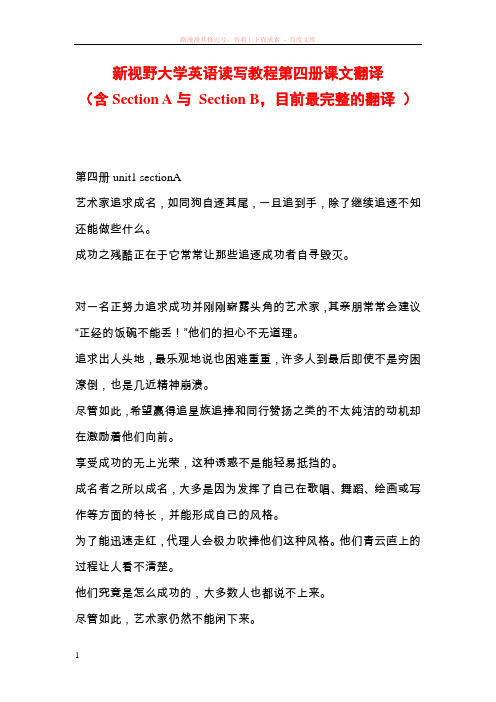
新视野大学英语读写教程第四册课文翻译(含Section A与Section B,目前最完整的翻译)第四册unit1 sectionA艺术家追求成名,如同狗自逐其尾,一旦追到手,除了继续追逐不知还能做些什么。
成功之残酷正在于它常常让那些追逐成功者自寻毁灭。
对一名正努力追求成功并刚刚崭露头角的艺术家,其亲朋常常会建议“正经的饭碗不能丢!”他们的担心不无道理。
追求出人头地,最乐观地说也困难重重,许多人到最后即使不是穷困潦倒,也是几近精神崩溃。
尽管如此,希望赢得追星族追捧和同行赞扬之类的不太纯洁的动机却在激励着他们向前。
享受成功的无上光荣,这种诱惑不是能轻易抵挡的。
成名者之所以成名,大多是因为发挥了自己在歌唱、舞蹈、绘画或写作等方面的特长,并能形成自己的风格。
为了能迅速走红,代理人会极力吹捧他们这种风格。
他们青云直上的过程让人看不清楚。
他们究竟是怎么成功的,大多数人也都说不上来。
尽管如此,艺术家仍然不能闲下来。
若表演者、画家或作家感到无聊,他们的作品就难以继续保持以前的吸引力,也就难以保持公众的注意力。
公众的热情消磨以后,就会去追捧下一个走红的人。
有些艺术家为了不落伍,会对他们的写作、跳舞或唱歌的风格稍加变动,但这将冒极大的失宠的危险。
公众对于他们藉以成名的艺术风格以外的任何形式都将不屑一顾。
知名作家的文风一眼就能看出来,如田纳西?威廉斯的戏剧、欧内斯特?海明威的情节安排、罗伯特?弗罗斯特或T.S.艾略特的诗歌等。
同样,像莫奈、雷诺阿、达利这样的画家,希区柯克、费里尼、斯皮尔伯格、陈凯歌或张艺谋这样的电影制作人也是如此。
他们鲜明独特的艺术风格标志着与别人不同的艺术形式上的重大变革,这让他们名利双收,但也让他们付出了代价,那就是失去了用其他风格或形式表现自我的自由。
名气这盏聚光灯可比热带丛林还要炙热。
骗局很快会被揭穿,过多的关注带来的压力会让大多数人难以承受。
它让你失去自我。
你必须是公众认可的那个你,而不是真实的你或是可能的你。
21世纪大学英语读写教程第四册课后练习中英互译答案

21世纪英语读写教程第四册课后翻译答案Unit1If great achievers share anything, said Simonton, it is an relenting drive to succeed. “There is an tendency to think that they are endowed with somethingsuper-normal,”he explained. “But what comes out of the research is that there are great people who have no amazing intellectual processes. It’s a difference in degree. Greatness is built upon tremendous amounts of study, practice and devotion.”西蒙顿说,如果事业上取得巨大成就者具有什么共性的话,那就是一种持续不断追求成功的动力人们往往认为他们具备一些超常非凡的东西,但研究表明,有的伟人并没有惊人的智力。
有的只是程度上的差异而已。
伟大是建立在大量的学习、实践和献身精神的基础之上的。
He cited Winston Churchill, Britain’s prime minister during World War II, as an example of a risk-taker who would never give up. Thrust into his office when his country’s moral was at its lowest, Churchill rose brilliantly to lead the British people. In a speech following the Allied evacuation at Dunkirk in 1940, he inspired to nation when he said, “We should not flag or fail. We shall go on to the end…We shall never surrender.”他举出二战时期的首相温斯顿·邱吉尔作为一个永不放弃的冒险者的典范。
21世纪大学英语读写教程(四)unit1课文及翻译
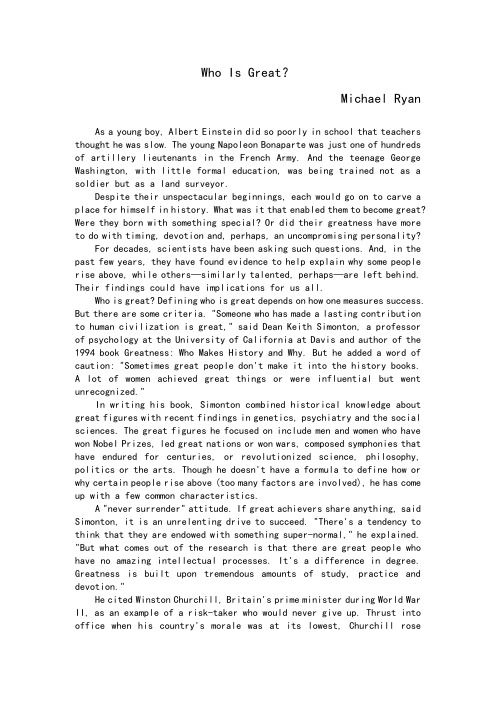
Who Is Great?Michael RyanAs a young boy, Albert Einstein did so poorly in school that teachers thought he was slow. The young Napoleon Bonaparte was just one of hundreds of artillery lieutenants in the French Army. And the teenage George Washington, with little formal education, was being trained not as a soldier but as a land surveyor.Despite their unspectacular beginnings, each would go on to carve a place for himself in history. What was it that enabled them to become great? Were they born with something special? Or did their greatness have more to do with timing, devotion and, perhaps, an uncompromising personality?For decades, scientists have been asking such questions. And, in the past few years, they have found evidence to help explain why some people rise above, while others—similarly talented, perhaps—are left behind. Their findings could have implications for us all.Who is great? Defining who is great depends on how one measures success. But there are some criteria. "Someone who has made a lasting contribution to human civilization is great," said Dean Keith Simonton, a professor of psychology at the University of California at Davis and author of the 1994 book Greatness: Who Makes History and Why. But he added a word of caution: "Sometimes great people don't make it into the history books.A lot of women achieved great things or were influential but went unrecognized."In writing his book, Simonton combined historical knowledge about great figures with recent findings in genetics, psychiatry and the social sciences. The great figures he focused on include men and women who have won Nobel Prizes, led great nations or won wars, composed symphonies that have endured for centuries, or revolutionized science, philosophy, politics or the arts. Though he doesn't have a formula to define how or why certain people rise above (too many factors are involved), he has come up with a few common characteristics.A "never surrender" attitude. If great achievers share anything, said Simonton, it is an unrelenting drive to succeed. "There's a tendency to think that they are endowed with something super-normal," he explained. "But what comes out of the research is that there are great people who have no amazing intellectual processes. It's a difference in degree. Greatness is built upon tremendous amounts of study, practice and devotion."He cited Winston Churchill, Britain's prime minister during World War II, as an example of a risk-taker who would never give up. Thrust into office when his country's morale was at its lowest, Churchill rosebrilliantly to lead the British people. In a speech following the Allied evacuation at Dunkirk in 1940, he inspired the nation when he said, "We shall not flag or fail. We shall go on to the end...We shall never surrender."Can you be born great? In looking at Churchill's role in history —as well as the roles of other political and military leaders—Simonton discovered a striking pattern: "Firstborns and only children tend to make good leaders in time of crisis: They're used to taking charge. But middle-borns are better as peacetime leaders: They listen to different interest groups better and make the necessary compromises. Churchill, an only child, was typical. He was great in a crisis, but in peacetime he was not effective—not even popular."Timing is another factor. "If you took George Washington and put him in the 20th century he would go nowhere as a politician," Simonton declared. "He was not an effective public speaker, and he didn't like shaking hands with the public. On the other hand, I'm not sure Franklin Roosevelt would have done well in Washington's time. He wouldn't have had the radio to do his fireside chats."Can you be too smart? One surprise among Simonton's findings is that many political and military leaders have been bright but not overly so. Beyond a certain point, he explained, other factors, like the ability to communicate effectively, become more important than innate intelligence as measured by an IQ test. The most intelligent U.S. Presidents, for example—Thomas Jefferson, Woodrow Wilson and John F. Kennedy—had a hard time getting elected, Simonton said, while others with IQs closer to the average (such as Warren G. Harding) won by landslides. While political and economic factors also are involved, having a genius IQ is not necessary to be a great leader.In the sciences, those with "genius level" IQs do have a better chance at achieving recognition, added Simonton. Yet evidence also indicates that overcoming traditional ways of thinking may be just as important.He pointed to one recent study where college students were given a set of data and were asked to see if they could come up with a mathematical relation. Almost a third did. What they did not know was that they had just solved one of the most famous scientific equations in history: the Third Law of Planetary Motion, an equation that Johannes Kepler came up with in 1618.Kepler's genius, Simonton said, was not so much in solving a mathematical challenge. It was in thinking about the numbers in a unique way—applying his mathematical knowledge to his observations of planetary motion. It was his boldness that set him apart.Love your work. As a child, Einstein became fascinated with the way magnets are drawn to metal. "He couldn't stop thinking about this stuff," Simonton pointed out. "He became obsessed with problems in physics by thetime he was 16, and he never stopped working on them. It's not surprising that he made major contributions by the time he was 26.""For most of us, it's not that we don't have the ability," Simonton added, "it's that we don't devote the time. You have to put in the effort and put up with all the frustrations and obstacles."Like other creative geniuses, Einstein was not motivated by a desire for fame, said Simonton. Instead, his obsession with his work was what set him apart.Where such drive comes from remains a mystery. But it is found in nearly all creative geniuses—whether or not their genius is acknowledged by contemporaries."Emily Dickinson was not recognized for her poetry until after her death," said Simonton. "But she was not writing for fame. The same can be said of James Joyce, who didn't spend a lot of time worrying about how many people would read Finnegans Wake."Today, researchers have evidence that an intrinsic passion for one's work is a key to rising above. In a 1985 study at Brandeis University conducted by Teresa Amabile, now a professor of business administration at Harvard University, a group of professional writers—none famous—were asked to write a short poem. Each writer was then randomly placed in one of three groups: One group was asked to keep in mind the idea of writing for money; another was told to think about writing just for pleasure; and a third group was given no instruction at all.The poems then were submitted anonymously to a panel of professional writers for evaluation. The poetry written by people who thought about writing for money ranked lowest. Those who thought about writing just for pleasure did the best. "Motivation that comes from enjoying the work makes a significant difference, "Amabile said.当阿尔伯特.爱因斯坦是个小男孩的时候,他在学校里的成绩很差,老师们都觉得他反应迟钝。
- 1、下载文档前请自行甄别文档内容的完整性,平台不提供额外的编辑、内容补充、找答案等附加服务。
- 2、"仅部分预览"的文档,不可在线预览部分如存在完整性等问题,可反馈申请退款(可完整预览的文档不适用该条件!)。
- 3、如文档侵犯您的权益,请联系客服反馈,我们会尽快为您处理(人工客服工作时间:9:00-18:30)。
21世纪大学英语读写教程第四册课文翻译作者:?杏昀【Scarlett】Unit1-TextA谁是伟人?迈克尔?赖恩当阿尔伯特?爱因斯坦是个小男孩的时候,他在学校里的成绩很差,老师们都觉得他反应迟钝。
拿破仑?波拿巴年轻时只是法国陆军中几百名炮兵中尉中的一名。
没有接受过什么正规教育的乔治?华盛顿,十几岁时不是受训当兵而是受训做土地测量员。
尽管他们的起步平淡无奇,但是后来个个都青史留名。
究竟是什么使他们成了伟人呢?是否他们生来就有什么特别?亦或他们的伟大与生逢其时、与献身精神,也许与一种坚定的个性更为有关?几十年来,科学家们一直在问这样的问题。
在过去几年里,他们已经发现了一些情况,这些情况有助于解释为什么有些人出类拔萃,而另一些人----也许同样具有才华----却被抛在了后面。
他们的发现可能对我们每个人都有意义。
谁是伟人?伟人的定义取决于如何衡量成功。
但标准还是有的。
“对人类文明作出永久性贡献的人是伟大的,”基思?西蒙顿院长说。
他是加州大学戴维斯分校的一名心理学教授,是1994年出版的《伟大:谁创造了历史,原因何在》一书的作者。
但他又提醒说:“有时侯伟人并没有被载入史册。
许多女性取得了巨大成就,或者颇具影响力,但却没有得到公认。
在这本书的写作中,西蒙顿融合了关于伟大人物的历史知识以及遗传学、精神病学和社会科学领域的最新发现。
他所聚焦的伟人包括获得过诺贝尔奖、领导过伟大国家或打赢过战争、谱写过流芳百世的交响乐、或在科学、哲学、政治、艺术上引起过巨变的男女人物。
虽然他没有一个公式来解释有些人怎样或者怎么出类拔萃(涉及的因素太多了),但他却提出了一些共同的特点。
一种“永不屈服”的态度。
西蒙顿说,如果成就巨大者具有什么共性的话,那就是一种坚持不懈地追求成功的动力。
“往往有人认为他们具备一些超常非凡的东西,”他解释道。
“但研究表明,有些伟人并没有惊人的智力,有的只是程度上的差异而已。
伟大是建立在大量的学习、实践和献身精神的基础之上的。
”他举了二战时期的英国首相温斯顿?丘吉尔作为永不放弃敢于冒险的典范。
丘吉尔在全国士气最为低落的时候被推上了台,并出色地领导了英国人民。
在1940年盟军敦刻尔克大撤退之后的一次演讲中,他的话激励了全国人民,“我们决不会退缩、永不失败。
我们一定要坚持到底......我们永远不会屈服。
”你会天生就伟大吗?西蒙顿经过研究丘吉尔在历史上的作用----通过研究其他政治和军事领袖的作用----发现了一个惊人的模式:“长子长女和独生子女往往会成为危难时期的优秀领导者:他们习惯于承担责任。
但是在和平时期,中间出生的人们是更好的领袖;他们更善于倾听不同利益群体的呼声,作出必需的妥协。
独生子丘吉尔就很典型。
他在危难中是伟大的,但是在和平时期却并不称职----甚至于不得人心。
”生逢其时是又一个因素。
“如果你把乔治?华盛顿放在20世纪,他作为一个政治家将一事无成,”西蒙顿宣称。
“他不善于公开演讲,他也不喜欢同公众握手。
反之,我看富兰克林?罗斯福若在华盛顿的时代也很难有所作为。
火炉边谈话是不会有收音机来为他广播的。
”你会过于太聪明吗?西蒙顿有一个出人意料的发现,许多政治和军事领袖虽然很聪明,但并非过于聪明。
他解释说,超过了一定程度,有效沟通的能力等其它因素比智商测试测得的先天智力更为重要。
西蒙顿说,最具才智的美国总统----如托马斯?杰斐逊,伍德罗?威尔逊和约翰?F?肯尼迪等----好不容易才当选总统,而其他智商接近于平均水平的人(如沃沦? G?哈定)却在竞选中大获全胜。
因为还涉及到政治和经济因素,所以具备天才的智商并不一定会成为伟大领袖。
在科学领域,西蒙顿补充说,那些具有“天才级”智商的人确实更有可能获得承认。
然而,事实也表明克服传统的思维方式也许同样重要。
他提到最近的一项研究:给大学生们一系列数据,问他们能否找出一种数学关系。
几乎三分之一的人找了出来。
他们并不知道他们刚刚解出的是历史上最著名的科学等式之一:行星运动第三定律,约翰尼斯?开普勒在1618年发现了一个等式。
西蒙顿说,开普勒的天才并不在于解决了一道数学难题,而在于用一种独特的方式思考数字----将数学知识运用到对行星运动的观测之中。
正是他的胆识使他与众不同。
热爱工作。
童年时,爱因斯坦迷上了磁铁同金属相吸的现象。
“他忍不住要去想这种东西,”西蒙顿指出。
“他16岁就对物理学的问题着了迷,并从未停止过对它们的研究。
所以他在26岁时作出重大的贡献也就不足为怪了。
”“对我们大多数人来说,并不是我们没有这能力,”西蒙顿补充说,“而是我们没有投入时间。
你一定要投入精力,并承受一切挫折和障碍。
”像其他有创造性的天才一样,爱因斯坦的动力并非对名誉的渴望,西蒙顿说。
相反,是他对工作的痴迷使他与众不同。
这样的动力来自何处仍是一个谜。
但它几乎在一切有创造性的天才身上都能找到----无论他们的才华是否得到同代人的认可。
“艾米莉?迪金森的诗歌直到她去世后被人承认,”西蒙顿说。
“但她不是为了名而写的。
詹姆斯?乔伊斯也是如此,他没有多费时间去担心有多少人会读他的《为芬尼根守灵》。
”如今,研究者们有证据证明,对工作的内在热情是出类拔萃的一个关键。
现任哈佛大学工商管理教授特蕾莎?阿玛贝尔1985年在布兰代斯大学主持的一项研究中,要求一批专业作家----其中没有一位是有名气的----各写一首短诗。
当时每位作家被随机分别编到三个小组中:一个小组要求记住是为金钱而写;另一个小组要求想着只为消遣而写;第三个小组则没有给任何指示。
然后这些诗歌匿名交给一个由专业作家组成的评判小组进行评审。
想着为金钱而写作的人所写的诗歌排名最低。
那些想着只为消遣而写作的人写得最好。
“从对工作的喜爱中获得的动力起着重要的作用,”阿玛贝尔说。
Unit1-TextB怎样当领袖迈克尔?柯达此刻当我们关注着究竟选出了一名总统还是一位领袖的时候,很值得研究一下这两者之间的区别。
因为并非每个总统都是领袖,而我们每次选举总统时都希望选出的是一位领袖,尤其是在疑虑重重、危机四伏的时代。
在太平盛世我们的心情则是矛盾的---因为领袖毕竟严于律人,挑战现状,把事情推倒重来。
当领袖同其它事情一样是个生逢其时的问题。
领袖必须在人们寻求领袖的时刻出现,就像丘吉尔在1940年,罗斯福在1933年,列宁在1917年出现那样。
而在他出现时,他必须提出一句简单而有说服力的口号。
伟大的领袖几乎总是十分善于化繁为简,他会绕过争执、辩论和疑惑,提出一个人人都能理解并记住的解决方案。
丘吉尔告诫英国人要准备好迎接“鲜血、苦难、眼泪和汗水”;富兰克林?D?罗斯福告诉美国人“我们唯一需要恐惧的就是惧怕本身”;列宁许诺厌倦战争的俄国人和平、土地和面包。
这些都是直截了当而令人信服的口号。
如果领袖能够做一些常人做不到的事情,那也很有作用:富兰克林?D?罗斯福克服了小儿麻痹症;毛泽东在72岁游长江。
我们不希望领袖“像我们一样。
”我们希望他们像我们但更出色、更特别。
然而,如果他们过于与众不同,我们又会排斥他们。
阿德莱?斯蒂文森就过于理智,纳尔逊?洛克菲勒则过于富有。
领袖必须懂得如何运用权力(这正是领袖要做的事情),但他还必须有办法来显示这一点。
他必须能表现出他的坚定----身体不能笨拙(像福特),眼睛不能溜溜转动(例如卡特)。
一位中国哲人曾经说过,领袖必须具备优秀舞蹈家的风度,这话很有道理。
领袖应该知道如何显得轻松自信。
他的步态应该坚定果断。
他应该像林肯、罗斯福、杜鲁门、艾克和肯尼迪那样会纵情欢笑,而不是个像尼克松或卡特那样笑得龇牙咧嘴、令人恶心算是心情不错。
罗纳德?里根受过的演技训练在他跟卡特的辩论中显示出了良好的效果。
他以潇洒自如的举止和显而易见的和蔼可亲成功地给人一种印像,即他事实上是总统而卡特是挑战者。
如果我们清楚找什么,那为什么又这么难找到呢?答案在于关于领袖的一条非常简单的真理。
人民只能被领到他们想去的地方。
领袖虽然领先一步,但必须遵从民意。
美国人想要摆脱大萧条,需要有人告诉他们能够做到,而富兰克林?D?罗斯福就这样做了。
英国人相信他们在1940年的失败后仍然能打赢战争,丘吉尔告诉他们这个想法很对。
领袖乘风破浪,顺应潮流,并理解人民内心深处的愿望。
他无法使一个不惜一切代价渴求和平的国家发动战争,他也无法使一个决心战斗的国家停止战斗。
他的目标必须符合民族的情绪。
他的任务是汇聚人民的能量和愿望,用简单的语句把它们讲清楚,进行鼓动,让人民想要的东西看上去是可以得到的、重要的、是他们力所能及的。
首先,他必须使我们的愿望变得崇高,让我们相信我们正在参与创造伟大的历史,并赋予我们一种荣誉感。
温斯顿?丘吉尔通过纯粹的修辞艺术,把英国的失败和1940年的敦刻尔克大撤退变成了大胜利。
富兰克林?D?罗斯福的话把美国舰队在珍珠港的沉没变成了动员全国的战斗口号,而不是不光彩的国耻。
领袖必须激发我们的热情,而不是唤起我们的理性。
因此,商人一般当不了好领袖。
他们往往是实用主义者,他们认为一旦你说明了某件事情有道理,人们就会去做。
但是历史表明这种想法是错误的。
当时世变得艰难时,人们不想被得知出了什么问题,不想听人训斥,不想了解许多他们不懂的复杂数据和计划(比如卡特的能源政策)。
他们想要受到感动、得到鼓舞、有人激励、有人安慰、感到振奋---总而言之,想有人来领导!一个伟大的领袖必须具有某种非理性的特点,他顽固地拒绝面对现实,他的乐观精神富有感染力,即使在我们担心一切都已经失去时,他也能使我们确信事实并非如此。
孔子说过,伟大领袖的谋士们应该冷若冰霜,但领袖本人却应该热情似火,有一点神圣的疯狂。
领袖只有在我们准备好迎接他时才会到来,因为领袖就像一面镜子,把我们自己的目标反射给我们,把我们自己的梦想和希望用言语表达出来,把我们的需要和畏惧变成有条理的政策和纲领。
我们的力量使他坚强;我们的决心使他坚定;我们的勇气使他成为英雄;总之,他代表了我们身上最优秀的品质,是由我们的精神和意志塑造而成的。
当我们缺乏这些品质时,我们不能创造他;即使用上我们在形像塑造上的所有技能,我们也不能把他伪造出来。
他毕竟只是我们全体相加的总和。
Unit2-TextA我们需要感激.克罗宁一个晴朗的下午,我在纽约上了一辆出租车。
从司机的表情和他猛拉排挡的样子中,我可以看出他很不高兴。
我问他是怎么回事。
“我完全有理由生气,”他怒气冲冲地说。
“今天上午一个乘客把钱包忘在我车里了。
里面差不多有300块钱。
我花了一个多小时想方设法找那个家伙。
最后我在他住的旅馆里找到了他。
他一声不吭地拿了钱包,还瞪着眼看我,好象我本来想要偷他的钱包似的。
”“他没有给你酬谢?”我大声问。
“一个子儿也没有。
但我要的不是钱......”他咕哝着,然后突然大声说,“只要那个家伙说句什么......”因为他诚实的助人行为没有得到感激,那位出租车司机一整天都闷闷不乐,而且我知道以后他在做类似的好事之前会三思而行了。
